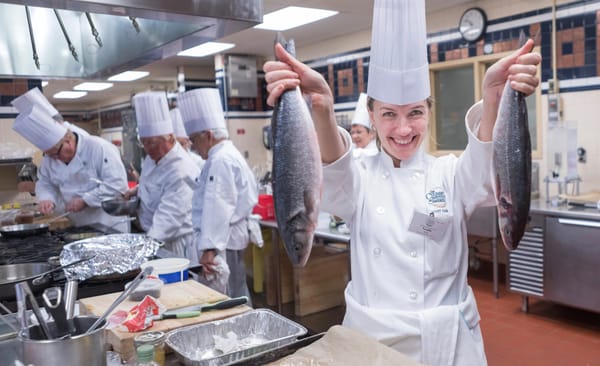Fun For Foodies: Classes And Boot Camps At The CIA
Take an intensive CIA cooking class where you'll learn new skills from the world's top chefs (but you won't be chopped).

Take an intensive CIA cooking class where you'll learn new skills from the world's top chefs (but you won't be chopped).

Action at the Worlds of Flavor Boot Camp at The Culinary Institute of America (Photo by Phil Mansfield)
The Culinary Institute of America in Hyde Park, New York is considered to be one of the most prestigious cooking schools in the world. With that comes a perceived air of exclusivity. But, in fact, the gates are wide open to all with a desire to expand their skills in the kitchen.
The CIA offers a comprehensive selection of public cooking classes and multi-day “boot camps” that allow anyone the opportunity to learn techniques and recipes in the same environment that’s produced some of this planet’s best chefs.
Classes range from introductory kitchen basics to a global tour of international cuisine. There are one-day classes on just about everything: the regional cooking of Spain and Italy, classic and contemporary sauces, baking and gluten-free baking classes ($250 each), classes for kids ($500), classes on wine ($125) and, in anticipation of the Asahi Shuzo sake brewery coming soon to Hyde Park, an "enjoying sake" class ($99).
The CIA also recently teamed up with America’s Test Kitchen to offer a series of classes, pulling from the expertise of both institutions. The variety and amount of classes offered to the public might surprise you. All classes are taught by accomplished CIA teaching chefs, many of whom have been cooking and publishing cookbooks on these topics for years.
Chef David Bruno leads all the boot camps offered at the CIA, which are more intensive, three-to-four-day deep dives into a particular subject ($1,350-$2,250). He says it’s gratifying to see folks get over their reservations and cook the way they've always wanted to.
“Generally, people come in a little nervous,” Bruno says. “But they quickly get over that when they see that we are here to help. They’re excited to be in a professional environment. I hear a lot of things like ‘I’ve been cutting an onion wrong all these years!' It’s exciting for people to learn there’s a right way, or a better way, or an easier way, to do things. That usually lends itself to becoming faster.”
Bruno says learning how to do things like properly break down or “fabricate” a chicken into its parts is a skill he sees students really enjoy. Buying a full bird is cheaper than buying individual cuts, you get more pieces for different dishes and making stock, and it’s fun.
“We offer these [boot camps] with the same set of rigor as we do for our degree students,” says the chef. “We follow the same standards. Everyone gets a uniform.”
Classes reflect what’s in vogue but Bruno was sure to point out that the classes don’t follow food trends since the CIA is setting those trends in the first place. One such trend he points to is the desire for more meatless dishes. He now offers a Plant-Powered Cooking boot camp.
Classes also cover a lot about the science of cooking, giving attendees a more thorough, well-rounded understanding of what they are doing when they cook.
Although you can register for any class at any time, Bruno recommends that if you intend to take multiple classes, start with the Basic Boot Camp as it will give you a foundation that will help you in any other class. It's also a challenging option that delivers a lot of bang for your buck, with every single day offering a condensed version of multiple specialized boot camps.
“Most of our degree students are right out of high school. They have a lot of energy and desire but not a lot of experience,” says Bruno. “[Public students] have the experience, they travel, they know cuisine. They just don’t know how to cook it at a high level.”
As a resource to local residents, the classes at the CIA are a rare opportunity to not just get a glimpse of this storied institution but take a piece of it home with them.




